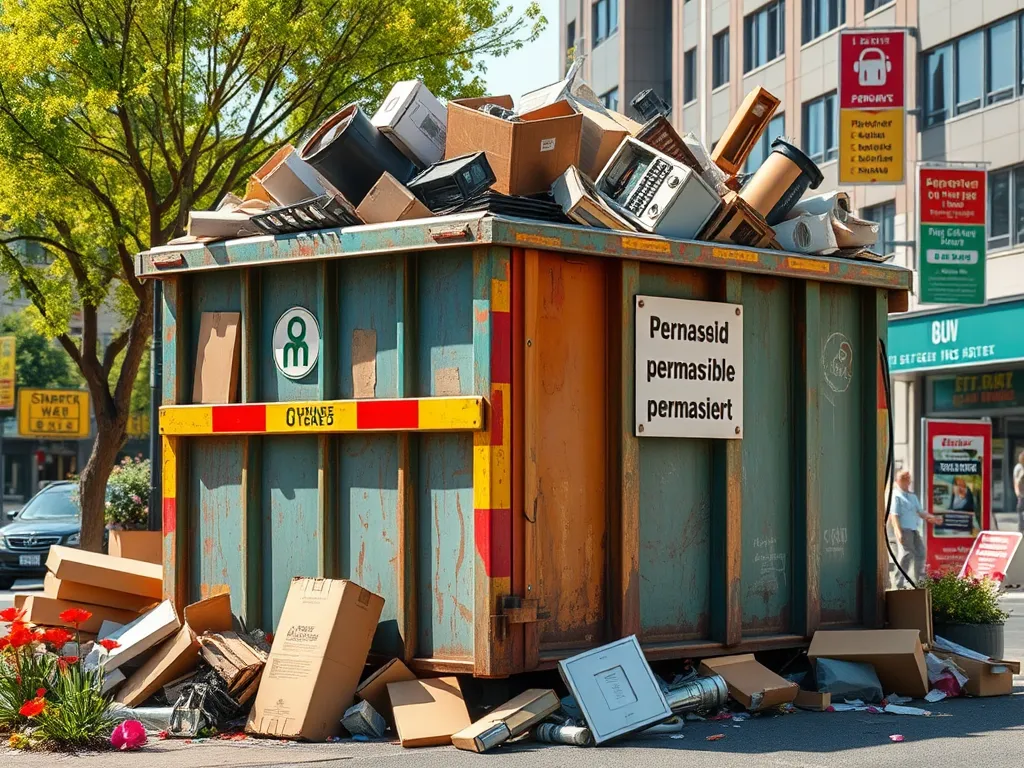What Items Are Allowed in Your Dumpster? Discover the Rules

A Comprehensive Guide to Allowed Dumpster Items
When it comes to waste management, understanding the categories of allowed dumpster items is crucial. Whether you are undertaking a home renovation, clearing out your office, or handling yard work, knowing what can go inside a dumpster will help you avoid fines and ensure efficient waste disposal. This guide will walk you through the types of permitted items, aiding both residential and commercial projects.
Allowed dumpster items typically include a range of household and commercial products that can be disposed of safely in a dumpster. This includes items such as old furniture, yard waste, appliances, construction debris, and certain recyclable materials. It is essential to check local regulations and the specific dumpster rental service policies to ensure compliance, as these items may vary based on location and company.
Understanding waste disposal regulations is crucial, so you might wonder, In A Dumpster, What Can You Put? to avoid fines.
For residential projects, allowed dumpster items include items commonly found in homes such as wood, textiles, and certain appliances. Yard waste, like branches, leaves, and grass clippings, is also acceptable, provided you follow specific guidelines. In commercial settings, allowed items consist of office equipment, retail waste, and packaging materials, although there are also restrictions on hazardous wastes that must be observed.
When renting a dumpster, you are likely to encounter certain special items that have specific disposal regulations. These include electronics, tires, mattresses, paint, and chemicals. Understanding these regulations is important to ensure that you are compliant during the disposal process. Failure to acknowledge proper disposal methods can lead to environmental harm and potential legal issues.
Lastly, it is crucial to consider the environmental aspects of waste management. Improper disposal of waste can have significant negative impacts on the environment. Recycling options for items that cannot go into the dumpster, being aware of local landfill regulations, and participating in community waste reduction initiatives are all key components of responsible waste management.
Allowed Residential Dumpster Items
When it comes to residential dumpster items, homeowners often have a variety of items they want to dispose of. Commonly accepted household items include old furniture, broken appliances, and general household debris. It is important to sort through your items to avoid including any prohibited materials. Items such as mattresses may require special handling and should be checked against local regulations for disposal.
Yard waste is also an important category of allowed residential dumpster items. Most municipalities allow limited quantities of yard debris such as leaves, branches, grass clippings, and other organic materials. However, it is essential to consult local guidelines as there may be rules on how to bag or bundle yard waste for collection in a dumpster.
Appliance disposal falls under allowed dumpster items as well. Large appliances such as refrigerators, washers, and dryers can be disposed of in standard dumpsters. However, specific disposal regulations might apply depending on the type of appliance, especially for those containing refrigerants or hazardous materials that require special care and handling.
Construction debris is frequently disposed of using residential dumpsters, especially during home renovation projects. Items like wood, drywall, roofing shingles, and tiles are commonly permitted. Homeowners must ensure that they do not mix prohibited items with construction debris to avoid extra charges or penalties.
Accepted recyclable materials are also allowed as dumpster items. Many localities accept cardboard, paper, and certain plastics, provided that there are no contaminants. Be sure to check with your service provider regarding specific recycling rules in your area to maximize proper disposal and recycling options.
Allowed Commercial Dumpster Items
For commercial locations, dumpster items also vary widely based on the type of business. One significant category is office equipment disposal. Many businesses upgrade to new technology regularly, leading to a surplus of old equipment that needs disposal. Allowed items include old computers, printers, and office furniture, but be sure to follow any specific disposal regulations.
Retail waste management is another common aspect of dumpster use in commercial settings. Retail businesses generate a variety of waste, from unsold inventory to packaging materials. Allowed items often include cardboard boxes, plastic wraps, and display fixtures. Business owners need to ensure that no hazardous or prohibited items are included to remain compliant.
Packaging material guidelines are crucial for commercial dumpsters. Many commercial entities produce excess packaging waste, which can be disposed of in a dumpster. However, not all types of packaging are accepted, so it's essential to verify what materials are acceptable, such as cardboard or certain types of plastics.
Food waste management practices are growing in importance within the commercial sector. While many businesses are encouraged to recycle and compost organic matter, the disposal of food waste in dumpsters is allowed under certain regulations. Ensure to separate compostable materials appropriately and consult local waste management rules for specific guidelines.
Hazardous waste restrictions are vital to consider for commercial dumpster use. Businesses must comply with local laws regarding hazardous materials, including chemicals, batteries, and specific electronics. Failure to adhere to these guidelines can result in significant fines and environmental damage.
Special Items and Regulations
Electronics disposal rules vary widely, but are essential when dealing with allowed dumpster items. Many communities have specific requirements for electronic waste due to the chemicals and components that can harm the environment. It's generally advisable to find designated e-waste recycling centers for the disposal of items such as computers, televisions, and mobile devices.
Tire disposal guidelines must be observed as well since tires cannot be disposed of in regular dumpsters. Many localities have specific collection programs or recycling facilities designed for tire disposal. Businesses and homeowners should seek out these resources to ensure proper tire management.
Mattress and box spring policies often vary by location. Many cities have laws governing how mattresses should be disposed of, as they can take up significant space in landfills. Commonly, recycling programs specifically for mattresses are available, making it crucial to check local options.
Paint and chemical disposal standards are also significant to navigate. Most municipalities prohibit liquid paints and hazardous chemicals from being thrown in a dumpster, necessitating specific drop-off sites or collection events for safe disposal. Always consult local guidelines for handling unwanted chemicals to prevent environmental contamination.
A prohibited items list is generally provided by dumpster rental services, but can include items such as hazardous waste, tires, batteries, and certain types of construction debris. Knowing what is prohibited will help avoid additional costs and potential legal issues.
Environmental Considerations
The impact of improper disposal cannot be understated. When items are disposed of incorrectly, it poses great risks to the environment, including pollution and harm to local wildlife. Understanding what qualifies as allowed dumpster items helps mitigate this risk and promote responsible waste management practices.
Recycling options for forbidden items can lessen the ecological footprint of waste management. Many communities offer recycling programs for materials that cannot be thrown in regular dumpsters, helping to divert waste from landfills. Engaging with these programs promotes greater sustainability.
Local landfill regulations can help define what is and isn’t allowed in dumpsters. It’s important to familiarize yourself with these regulations to ensure compliance with disposal practices as they differ from one municipality to another.
Sustainable waste management practices are increasingly becoming a focal point for communities looking to reduce landfill waste. Implementing recycling programs, promoting composting, and encouraging minimal waste alternatives helps drive conscious consumerism and waste production.
Community waste reduction initiatives can offer additional guidance on proper disposal. Many local programs focus on encouraging recycling, responsible waste management, and public awareness regarding the importance of proper disposal practices.
Frequently Asked Questions
What happens if you throw away prohibited items? Proper disposal practices are essential, as throwing prohibited items in a dumpster can lead to hefty fines. Waste management companies often conduct audits and if incorrect items are found, disposal costs may be charged to the customer.
How to find a nearby recycling facility? Local government websites are excellent resources for locating recycling facilities. Many municipalities provide lists of accepted items and nearby drop-off centers, ensuring proper disposal and recycling.
What to do with hazardous materials? Hazardous materials should never go in a dumpster. Instead, check local guidelines for hazardous waste collection days and designated drop-off facilities to ensure safe disposal.
What size dumpster do I need? Determining the size of a dumpster depends on the volume and type of waste you have. Speak with your dumpster rental service to discuss your project’s specific needs and find a suitable size.
How to properly prepare items for disposal? Proper preparation includes sorting allowed items, cleaning recyclables, and ensuring no hazardous waste or prohibited materials are included. Properly bagging and labeling items will facilitate easier disposal.
